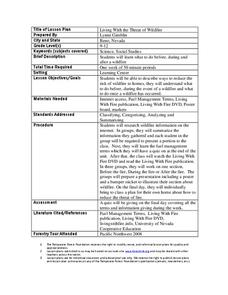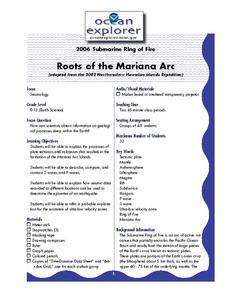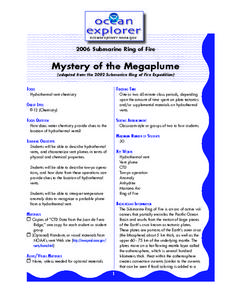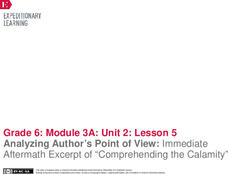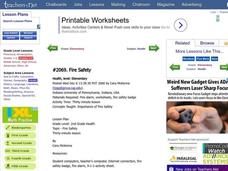NOAA
Animals of the Fire Ice
When the sun's rays can't reach the producers in a food web, where does all the energy come from? Extreme environments call for extreme food sources. Young scientists investigate creatures that appear to get their energy from methane...
Curated OER
Fifth Grade Fluency Practice
Fluency is crucial to reading success. This instructional activity provides a great technique for increasing fluency. Using Inspiration or Garage Band, learners record themselves reading a passage at their reading level and repeat the...
Curated OER
Hazards: First Grade Lesson Plans and Activities
Examine the environmental hazards associated with volcanoes with a three-part science lesson. In the pre-lab, first graders learn that gas, landslides, ash, and lava are all hazards that come from volcanoes. They then explore hazardous...
Curated OER
Summer Safety Activity: Stop, Drop, and Roll!
Students practice stop, drop and roll. For this fire safety lesson, students learn to stop when the music stops, drop when the music stops, and then roll when the music stops. That can be translated to stop, drop, and roll in case of a...
Curated OER
Living with the Threat of Wildfire
Learners describe the risk of wildfires. In this fire safety activity, pupils describe ways to reduce the risk of wildfires to residential areas. They study what to do before, during and after the occurrence of a wildfire. Learners...
Curated OER
Dig This Dinosaur Relief Lesson
Students create low-fire ceramic relief sculptures of dinosaur bones. They incorporate art history, aesthetics, and criticism with hands on activity. Students work together to draw an enlarged skeleton on butcher paper. The Stegosaurus...
Curated OER
The Great Fire of Saint John: Producing Historic Plays
Students produce a play about their community. In this historic play lesson, students research their community and script historic play books that provide a background about their community.
Curated OER
Full Dolch Word List
Sight words are listed based on how frequently they are used. There are 250 words on the list. This would be a good, general resource for a teachers of grades 1 - 3. It is useful to know what words your class should know, and how well...
Ocean Explorer
Living with the Heat
Young oceanographers study the Submarine Ring of Fire, which is a series of deep-water volcanic vents that come up from the ocean floor. Learners take a close look at the unique ecosystems that are associated with these areas, how these...
Curated OER
Roots of the Mariana Arc
Plumb the depths of the Submarine Ring of Fire and explore seismic waves with this lesson. Junior geologists simulate s-waves and p-waves, calculate their speeds, and then apply the data to discover the material that makes up inner...
Curated OER
Mystery of the Megaplume
Read through the extensive background information and then lead your geology or physical oceanography class through an investigation of actual temperature anomaly data from the Juan de Fuca ridge. They translate the data onto a plot,...
Curated OER
Japan and The Ring of Fire
Students engage in a study of the volcanic forces and earthquakes associated with The Ring of Fire in the Pacific Ocean. The people of Japan are researched in how they have dealt with living in the area. Also students write in journals...
Curated OER
The Great American Fire Drill
Students read a story about fire safety and create their own ending to the story in order to learn about fire escape plans and to demonstrate their writing skills. In this fire safety lesson, students discuss the parts of a story, read...
Curated OER
Projectile Motion (or You Bet Your Grade)
Students experiment with the velocity of a spring. In this velocity lesson, students conduct trials in order to determine the initial velocity of a spring. They stretch the spring different amounts and fire it both horizontally and...
Curated OER
Grade 2 Spelling Activity
In this 2nd grade spelling practice activity, 2nd graders complete a crossword puzzle regarding plurals and respond to an alphabetical order question.
Curated OER
Vocab. Quiz: Grade Two (Grade 2) Vocabulary List Two
In this second grade vocabulary worksheet, 2nd graders match the 15 terms in the left-hand column to the appropriate definitions in the right-hand column.
Forest Foundation
Exploring Heat & Energy
How does fire keep itself going? Explore the ways that heat uses fuel and energy with a activity about the fire triangle and combustion. Several activities demonstrate how heat moves from warmer objects to cooler objects, as well as the...
EngageNY
Finding the Gist of the Immediate Aftermath: Excerpt of “Comprehending the Calamity”
Brace for the aftershocks! Scholars read an excerpt from a primary source document about the immediate aftermath of the 1906 San Francisco fire and earthquake. Next, pupils complete an anchor chart, analyzing how the author introduces,...
CK-12 Foundation
Cannon Simulation
Fire in the hole! Thrill your classes as they see what it's like to fire a cannon ball. Scholars practice aiming a cannon ball by altering first the firing angle, then the velocity, and finally both simultaneously. Can they discover the...
Curated OER
Its or It's
What's the difference between its and it's? Clear up any misunderstandings in your third grade language arts class. Practice sentences use its or it's twice, prompting learners to use context clues for each usage. At the end of the...
EngageNY
Analyzing Author’s Point of View: Immediate Aftermath Excerpt of “Comprehending the Calamity"
Analyze that! Scholars continue reading and analyzing a primary source about the immediate aftermath of the 1906 San Francisco fire and earthquake. Then, individuals use graphic organizers to identify the author's point of view.
EngageNY
Taking Notes and Citing Quotes from Text: Gathering Information on our Rainforest Insects
In other words. Scholars practice using paraphrasing and quotes. They partner in pairs to write a paraphrase for an information text strip. Individuals then use their skills to paraphrase information from the text Fire Ants.
Curated OER
It's Going to Blow Up!
Students discover the major characteristics of volcanoes on the Pacific Ring of Fire. They describe the processes that produce the "Submarine Ring of Fire." students explain the factors that contribute to explosive volcanic eruptions.
Curated OER
Fire Safety
Second graders identify the appropriate time use the Stop, Drop, and Roll procedure through the completion of the lecture and activity provided. They define The Great Escape Method and recite Home Safety Rules.






